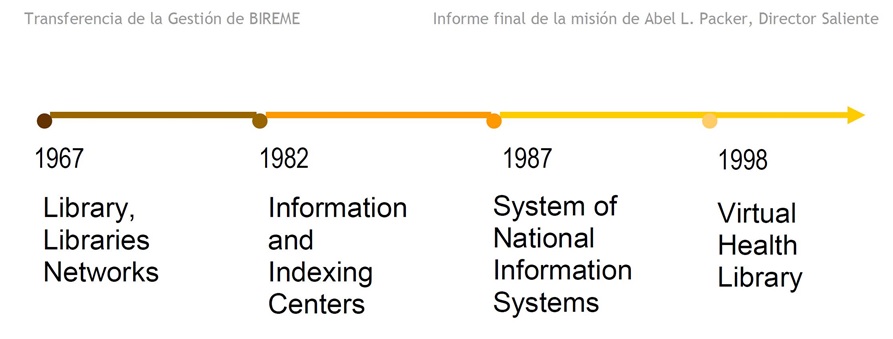The central operation of BIREME/PAHO/WHO along its 50 years of existence is marked by technical cooperation among research and education organizations and health care systems from Latin American and Caribbean (LA&C) countries and other developing regions. It is possible to identify in its history four successive periods, which are characterized by the scientific and technical information models adopted.
The first period comprises years 1967 to the end of the 1970’s and started with the establishment of BIREME as the BIblioteca REgional de MEdicina (Regional Medicine Library). The goal was to meet the need for a biomedical documentation center and library, mainly to give access to local scientific literature collections, provide user services, enable bibliographic search in the MEDLINE database, and provide access to photocopied documents, following the example of the U.S. National Library of Medicine (NLM).
In the second period, as of the 1980’s, BIREME incorporated the previous model and expands technical cooperation, incorporating bibliographic control of the health literature published in the Region. In addition, it expanded the theme coverage to encompass health sciences in general, and particularly, what was then known as social medicine and is to date called public health or collective health. In 1979, BIREME launched the Latin American Medical Index (IMLA), thus complementing MEDLINE, and starting its role to provide regional and international visibility to health scientific and technical production in the Region. This expansion enabled the change of its name to Latin American and Caribbean Center on Health Sciences Information, while maintaining its acronym BIREME. It is in this period that the IMLA reached the status of a bibliographic basis – Latin American and Caribbean Health Sciences Literature (LILACS), keeping its emphasis on Public Health.
During the third phase, from the end of the 1980’s to the end of the following decade, the Center invested in decentralizing the bibliographic control functions of scientific production to the countries of the Region, starting to count on a national coordinating organization in each country. Meanwhile, it kept the leadership of the process by creating the Latin-American and Caribbean System on Health Sciences Information. While LILACS evolved to cooperative production, decentralized indexing highly contributed to strengthen the development of technical capabilities and human resources in the different countries, thus supporting them and their institutions to develop compatible management and operation in the national scope and context. BIREME, in this phase, promoted the use of computers in libraries, both for decentralized production of LILACS database and bibliographic research in CD-ROM, which later evolved to Internet-based operations. It is also in this period that Health Sciences Descriptors (DeCS) were created, which include the translation of NLM Medical Subject Headings (MeSH) into Portuguese and Spanish, added by new descriptor categories, such as public health and environment.

The fourth period started in the end of the 1990’s, with the adoption of the Web as the main platform for cooperative production and sharing sources and flows of information. In 1998, the launch of the Virtual Health Library (VHL), with the San José Declaration, established a space of convergence, strategy, model and operational landmark in the production, use and dissemination of health information to reach equity in health. At the same time, BIREME, with the support of the São Paulo State Research Foundation (FAPESP) created SciELO – Scientific Electronic Library Online – a pioneering program to publish open-access scientific journals on the Web. SciELO started with ten Brazil’s journals and now has 15 national collections, one thematic collection – Public Health – and more than 1,200 journals operating in the international state-of-art of scientific of publication methodologies and technologies in all fileds of knowledge. As from 2010, the SciELO project started to be carried out by FapUNIFESP – UNIFESP Research Foundation – with BIREME’s collaboration.
The operation of the VHL and Associated Networks – SciELO, LILACS and DeCS, has contributed to increase visibility, accessibility, use, and impact of sources of information from LA&C, as well as of the science produced by the Region, thereby contributing to improve the living and health conditions of the its populations and the socioeconomic development of the countries.
Sources:
Transferencia de la gestión de BIREME. Informe final de la misión de Abel L.Packer, Director Saliente. Mayo de 2010
Informe de Avaliação da BVS em seus 10 anos de operação. Grupo de Trabalho para Avaliação da BVS. Setembro de 2008. Available at http://modelo.bvsalud.org/download/publicacoes/informe-bvs-10-anos-2008-pt.pdf